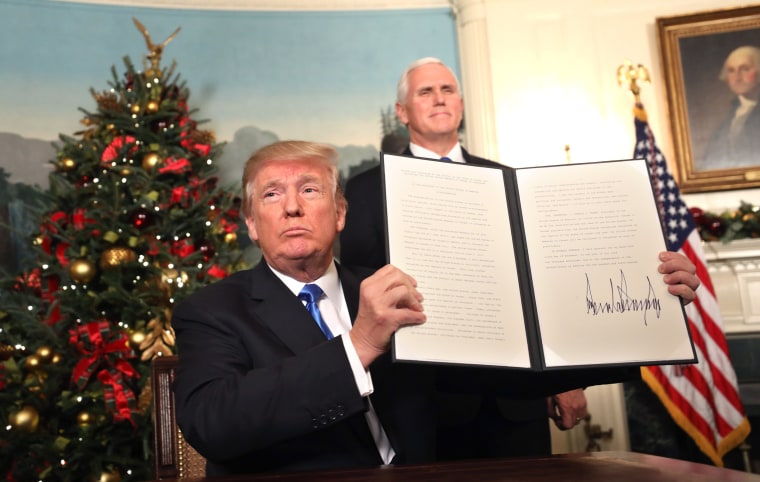President Donald Trump announced Wednesday that the U.S. would officially recognize Jerusalem as the capital of Israel, breaking with decades of precedent, sparking an uproar among world leaders, and further jeopardizing the prospects of Middle East peace.
"I have determined that it is time to officially recognize Jerusalem as the capital of Israel," Trump said from the Diplomatic Reception Room in the White House. "I have judged this course of action to be in the best interests of the United States of America and the pursuit of peace between Israel and the Palestinians."
"Today we finally acknowledge the obvious: That Jerusalem is Israel's capital. This is nothing more or less than a recognition of reality. It is also the right thing to do. It's something that has to be done," he added.
Trump also said he was putting in motion a move of the U.S. embassy to the holy city from Tel Aviv — a process that aides have said could take several years — by "directing State Department to begin preparations" for the move.
That includes "hiring architects, engineers and planners, so that a new embassy, when completed would be a magnificent tribute to peace," he said. The move marked a follow-through by Trump on a major campaign promise he'd made that had been closely followed by Israel and by evangelical Christians in the U.S.
Read: Trump's full speech on Jerusalem
After his remarks, Trump signed another six-month waiver to officially delay such a move — a document presidents have signed since 1995 as part of the Jerusalem Embassy Act. The law technically initiated the process of moving the embassy to Jerusalem, but allowed the commander-in-chief to sign a six-month waiver leaving the embassy in Tel Aviv.
Trump, however, said that decision by his three immediate predecessors left the world "no closer to a lasting peace agreement between Israel and the Palestinians" and that "it would be folly to assume that repeating the exact same formula would now produce a different or better result."
Israel — whose parliament and supreme court are seated in Jerusalem — and the Palestinians both claim the city as their capital, and Trump's decision breaks decades of precedent for the U.S. to not take sides in the dispute over Jerusalem.
Related: Trump's Jerusalem move undermines U.S. interests, analysts say
Since the 1979 Camp David Accords, U.S. presidents have refused to recognize Jerusalem as the capital of Israel or move the U.S. embassy. The U.S. approach has been that Jerusalem's status should be negotiated between the Israelis and Palestinians.
The Palestinians have sought the city's eastern sector, captured by Israel in the 1967 Mideast war, as the capital of a future independent state. They fear Trump's declaration essentially imposes on them a disastrous solution for one of the core issues in the Israeli-Palestinian conflict.
World leaders expressed grave concerns about the pending move, ahead of Trump's announcement, with Palestinian and Arab leaders warning that it could inflame the Arab world spark violence and further derail an already tenuous peace process.
The U.S. government seemed to anticipate such a backlash.
Ahead of the move, U.S. officials said that both Defense Secretary James Mattis and Secretary of State Rex Tillerson had voiced concerns about the threat that moving the embassy would create for American personnel from both agencies stationed in the region. In addition, the State Department sent out a cable to all diplomatic posts instructing officials to defer non-essential travel to Israel, Jerusalem and the West Bank from Dec. 4 to Dec. 20, officials with the agency told NBC News.
Later Wednesday, the U.S. Embassy in Amman, Jordan, said it had "temporarily suspended routine public services" and that "all embassy travel outside Amman, both official and personal, has been prohibited until further notice."
Secretary of State Rex Tillerson, meanwhile, called Trump's decision "bold" and confirmed, in a statement, his agency would immediately begin the process to implement this decision by starting the preparations to move the embassy.
Trump, in his speech Wednesday, called "for calm, for moderation, and for the voices of tolerance" and contended that the move was actually "a long-overdue step to advance the peace process and to work towards a lasting agreement."
Related: Trump plan to recognize Jerusalem as Israel’s capital triggers warnings
Trump maintained he would "do everything in my power to help forge such an agreement" and that the U.S. still supported a "two-state solution."
"We are not taking a position of any final status issues, including the specific boundaries of the Israeli sovereignty in Jerusalem, or the resolution of contested borders," Trump said. "Those questions are up to the parties involved."
Nevertheless, a senior administration official told NBC News Wednesday that the White House was "prepared" for the peace process "to be derailed temporarily," Still, the official said the White House was not concerned, and that after a week or months-long “cooling off period,” the U.S. will be better positioned to push for peace in the region.
Trump, in his remarks, said Vice President Mike Pence would head to Israel in the coming days to "reaffirm our commitment" to America's "partners throughout the Middle East." Pence's office said he would depart on Dec. 16 and would meet during his trip with Israeli Prime Minister Benjamin Netanyahu and Palestinian Authority President Mahmoud Abbas.
Pence will also travel to Egypt and meet with President Abdel Fattah al-Sisi, before returning to the U.S. on Dec. 22., Pence's office said.

